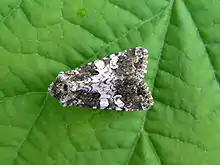Hadena compta
Hadena compta, the varied coronet, is a moth of the family Noctuidae. The species was first described by Michael Denis and Ignaz Schiffermüller in 1775. It is found in Europe, Morocco, Algeria, Turkey, Israel, Lebanon, Iraq, Iran, central Asia, southern Russia, China and Japan.
| Varied coronet | |
|---|---|
 | |
| Scientific classification | |
| Kingdom: | |
| Phylum: | |
| Class: | |
| Order: | |
| Family: | |
| Genus: | |
| Species: | H. compta |
| Binomial name | |
| Hadena compta Denis & Schiffermüller, 1775 | |
Technical description and variation
The wingspan is 25–30 mm. Seitz describes it: Forewing smaller than nana, with a vertical white fascia, the orbicular stigma, the white blotch beyond claviform and a blotch at middle of inner margin being confluent; no apical white blotch; — in viscariae Guen. the white fascia becomes yellowish or brownish; — humilis Christ [now full species Hadena humilis (Christoph, 1893)], from Armenia and the Taurus Mts., also has the fascia discoloured and much reduced in size, the ground colour often being dull grey. — Larva reddish grey; dorsal stripe redbrown, blotched on each segment and traversed by a conspicuous white central line; lateral lines yellowish; spiracles white on a cloudy grey shade; head redbrown.[1]
Biology
The moth flies from May to July depending on the location.
The larvae feed on Dianthus barbatus and Silene vulgaris.
References
- Warren. W. in Seitz, A. Ed., 1914 Die Großschmetterlinge der Erde, Verlag Alfred Kernen, Stuttgart Band 3: Abt. 1, Die Großschmetterlinge des palaearktischen Faunengebietes, Die palaearktischen eulenartigen Nachtfalter, 1914
 This article incorporates text from this source, which is in the public domain.
This article incorporates text from this source, which is in the public domain.
External links
- "Witband-silene-uil Hadena compta". De Vlinderstichting. Retrieved May 26, 2020. (in Dutch)
- "Varied Coronet Hadena compta (Denis & Schiffermüller, 1775)". Waarneming.nl. Retrieved May 26, 2020. (in Dutch)
- "Hadena compta ([Denis & Schiffermüller], 1775)". Lepidoptera of Belgium. Archived December 7, 2008.
- Kimber, Ian. "73.282 BF2170 Varied Coronet Hadena compta ([Denis & Schiffermüller], 1775)". UKMoths. Retrieved 26 May 2020.